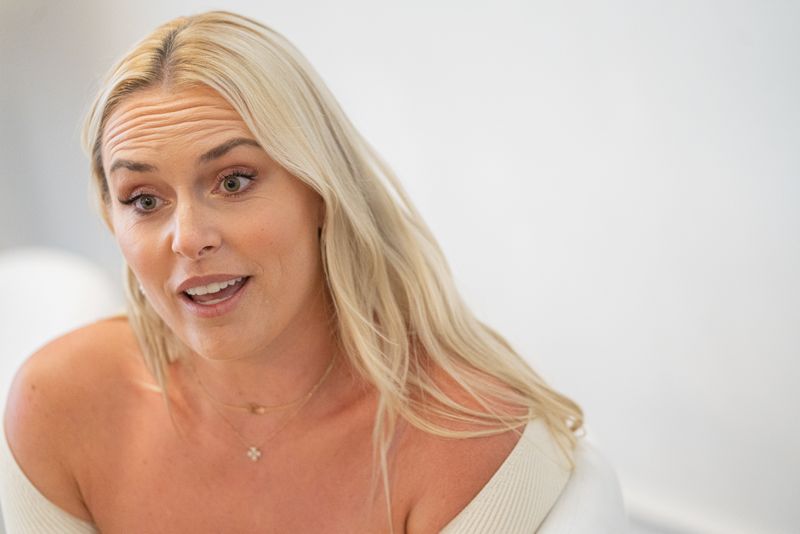High risk, High reward: Life Lessons with Lindsey Vonn
2023.11.15 06:30

© Reuters. FILE PHOTO: Olympic gold medalist skier Lindsey Vonn, speaks during an interview with Reuters in New York City, New York, U.S., May 17, 2022. REUTERS/Jeenah Moon/File Photo
By Chris Taylor
NEW YORK (Reuters) – If you think investing is scary, imagine skiing down the world’s most challenging mountains at 70 or 80 miles (112.7 or 128.8 km) an hour.
After doing that for years – and being the best in the world at it – nothing much fazes Lindsey Vonn.
The former World Cup overall champion and Olympic gold medalist may be retired from the slopes now, but slaloms her way through multiple business ventures at age 39.
For the latest in Reuters’ “Life Lessons” series, she talked with us about how to attack your career with speed, skill and courage.
Q: Your dad gave you some career advice very early on. What was it?
A: I was nine years old when I first decided I wanted to be an Olympian, after meeting my idol Picabo Street. We made a 10-year plan on how to make the Olympics. One thing he made sure I understood was that ski racing didn’t make any money.
If I wanted to have a successful career, I needed to be more than an athlete. I had to work harder than anyone else, and be smart about everything I did, because nothing would come easy, and I was not going to get a big contract.
Q: When you were just starting out, were you able to work at all?
A: I did a lot of babysitting for kids in my neighborhood. I made pretty good money, about $20 an hour. That was my spending money, which I would use to buy things like CDs. I’m the oldest of five, and three of my younger siblings are triplets, so I’m pretty good at managing kids. I changed a lot of diapers growing up.
Q: Was it difficult to plan a financial life, when you are only paid when you win?
A: For me it was a matter of motivation. I calculated in my head that if I won a certain number of races, I could finally get a car or buy a house. As I became more successful, the amount of guaranteed money went up, but that didn’t happen until the end of my career.
Real estate is something I particularly love investing in, because I travel so much. I love to have places to call home.
Q: What have you learned from your various business lines, such as ski wear?
A: There are always going to be challenges, obstacles, adversities, failures. Just like in sports, you have to find a way forward and learn from every mistake and figure out how to rectify it.
With my ski line, it’s about talking to retailers and consumers, and figuring out the right price points and materials and manufacturing. You never get it right the first time, but that’s what sports is all about: Learning through trial and error.
Q: You also like startups. What are your investing principles there?
A: That’s a little different and riskier. I look at the leadership: Who is the CEO, what is their mission, how do they approach business? Do I believe in the product? And do I believe in the person?
Sometimes businesses can have an amazing product, but it never goes anywhere if they don’t have an amazing leader.
Q: What other business lines are part of your portfolio?
A: It has been fun and inspiring to invest in other women, like with Angel City FC. In the past, not a lot of people followed women’s soccer, but I believe in them, the sport and what women can do. If I make some money, great. The main point was to invest in women.
Now with the SAG-AFTRA strike over, I am also focusing on my production company, with a few different shows in the works. I am also on the board for Salt Lake City’s Olympic bid committee for 2034. And my ski line just launched at Saks Fifth Avenue, so hopefully sales go well.
Q: What life lessons would you pass on?
A: Failure is your best lesson and your biggest opportunity. From a financial perspective, the biggest mistake I ever made was not managing my own money. I was making money at a young age, but I didn’t pay enough attention. That’s my biggest regret.
For youth, financial independence is one of the most important things for them to work towards – not being reliant on parents or partners and having their own bank accounts with money they can access at any time. That will give them the freedom to make choices in their own best interests.








